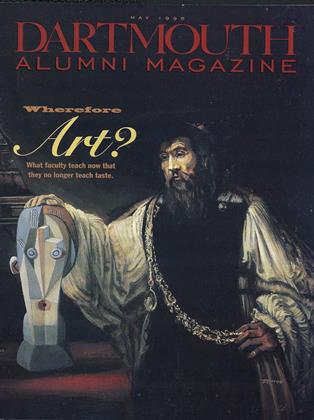The College's maintenance people have turned buildings and grounds into a canvas for practical arts.
What has 270 people, 18 pickup tracks, 12 vans, three dump tracks, and a high-lift crane? What else but Facilities Operations and Maintenance, best known to most alumni under its earlier name of Buildings and Grounds.
I don't claim that Dartmouth has the most beautiful buildings of any college in the world, nor even they handsomest grounds. I think Cambridge University is ahead of us on grounds, and both it and Oxford have finer buildings. Duke maintains a truly glorious rose garden. There is grandeur as well as crime at Yale.
But clearly we are blessed with a wonderful campus, and fortunately we have 270 people who mean to keep it that way. like everything about Facilities Operations and Maintenance except the name. Even that, I admit, is more accurate than the old name. It's just a little pretentious, like some of the polysyllabic course descriptions in the catalogue, or the word "educator, "so often used instead of plain "teacher."
F.O.&M. does everything well, it seems to me. What needs mowing gets mowed at just the right time. What should be left alone, like the half-mile of pines along the east bank of the river, gets left alone. (Not even Cambridge, in all the beauty of the Backs, has anything comparable to that.) Our buildings get their new copper roofs exactly when they need them—there is no deferred maintenance here. F.O. makes a serious and even mostly successful attempt to keep the dorm rooms warm but not overheated.
But smooth operation is something I more or less take for granted. It's for two other reasons that I love the operators fes of our facilities. One is that, like many other departments at the College, they have managed to stay flexible even in the A bureaucratic nineties. Call them and you get a human response, not a bump from one at tight-faced administrator to
Take my electric-car experience. I've been commuting to the College in a low-pollution electric vehicle since 1991. Most of that time I've been parking a downtown in a special place provided free by the town. (No meter, no quarters, no charge for the electricity. That meant the town was giving me about 50 cents' worth per day.)
But as I've moved into my late sixties, I find myself less and less fond of the long walk up from Main Street to Steele Hall, where I work. May is fine, but on a windswept morning in January, I of ten wish I were wearing three coats and a space helmet.
So last summer I sent a blitz to Mike Getter, the director of F.O.&M. Any chance of an electric-car parking space behind Steele Hall? I asked.
Two days later I got a phone call from John Gratiot, the associate director. He and the foreman of the College electric shop, Bill Corette, came over to poke around. There turned out to be no outlets available behind Steele. But it's only 75 yards to the College Observatory, and there two of our electricians, Ronald Corette and Richard Turner, installed me a handy plugin.
What a contrast to Boston University, where I was a visiting teacher in the fall of 1994. There, too, I needed a plug-in. To get it I had to crawl slowly up the hierarchical ladder to the most powerful person I knew, the associate provost. Even then, what he could find was further from where I worked than Main Street is from Steele Hall.
I've got about an inch left in this column to bring up the other thing I like most about F.O.& M. It must be one of the half-dozen most environmentally aware F.O.s in the country. Dartmouth has a brand-new organic farm. Dartmouth has a solar array on top of Murdough, making the first small portion of electricity. Dartmouth composts. Dartmouth even had two propane-powered trucks—owned, of course, by F.O.& M. They're not as clean as my electric car, but far superior to gasoline models.
It's a grand feeling, to work at a place you are proud of.
 View Full Issue
View Full Issue
More From This Issue
-
 Cover Story
Cover StoryWha is There to Teach About Art?
May 1996 By Rebecca Bailey -
 Feature
FeatureThe Art of Collecting
May 1996 By Diane Cyr -
 Feature
FeatureA Mini-Seminar On Two Hood Pieces
May 1996 -
 Feature
FeatureGuardian of Halos
May 1996 By Carl Little '76 -
 Feature
Feature9 Reasons Why the Hood Bought This Painting
May 1996 -
 Article
ArticleVisions of the Ancestors
May 1996 By Karen Endicott
Noel Perrin
-
 Letters to the Editor
Letters to the EditorLetters to the Editor
MARCH 1971 -
 Letters to the Editor
Letters to the EditorLetters to the Editor
JAN./FEB. 1978 -
 Article
ArticleDo Good Computers Make Good Writers?
APRIL 1997 By Noel Perrin -
 Article
ArticleThe Difference With Oberlin
APRIL 1998 By Noel Perrin -
 Article
ArticleFour Aces
SEPTEMBER 1998 By Noel Perrin -
 CURMUDGEON
CURMUDGEONHarness The Gym Rats
Nov/Dec 2000 By Noel Perrin
Article
-
 Article
ArticleThe Church in the Early Eighties
December 1921 -
 Article
ArticleLOCAL ASSOCIATIONS
June 1924 -
 Article
ArticleBest Class Secretary
July 1947 -
 Article
ArticleA Post-game Peregrination
OCTOBER 1984 By Dana Cook Grossman -
 Article
ArticleAssociated School News
October 1951 By Karl Hill -
 Article
ArticleA Determined Man
MAY 1972 By RUSTY MARTIN '68

